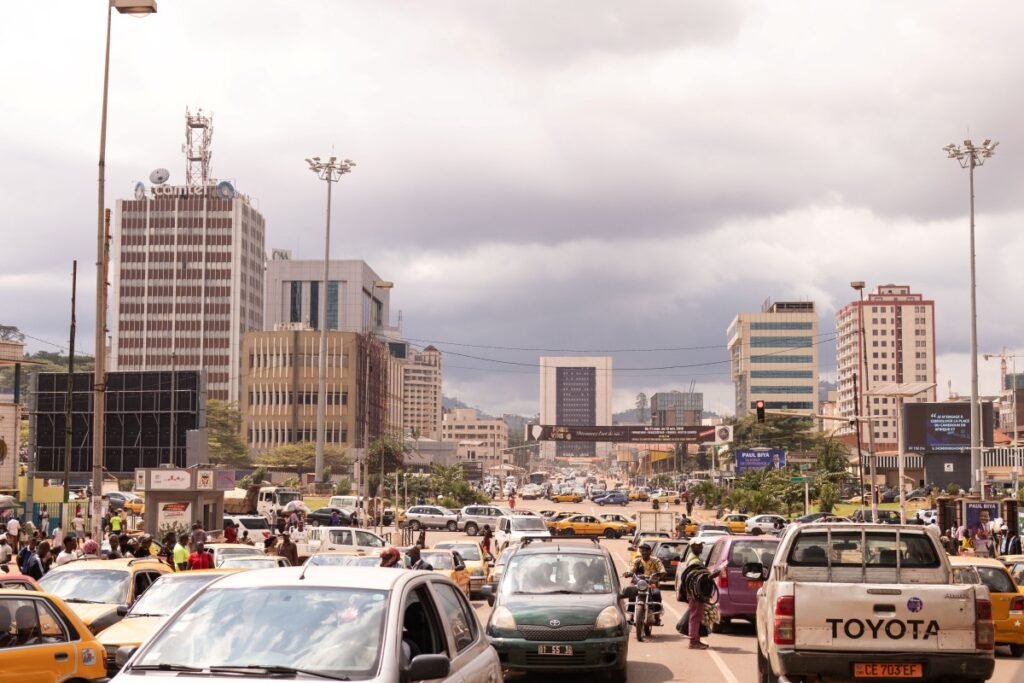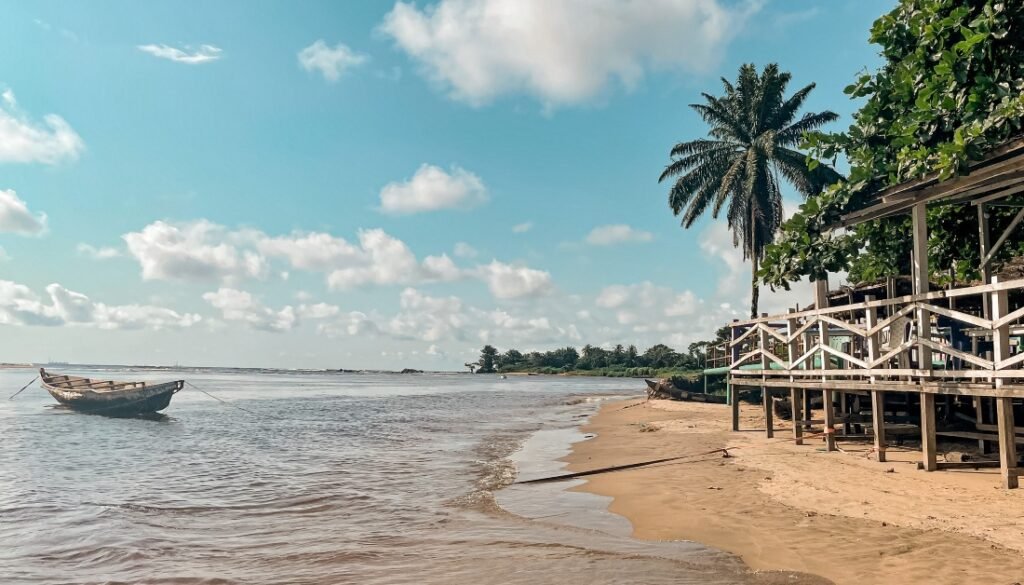Physical Address
304 North Cardinal St.
Dorchester Center, MA 02124

Unique Destinations for Distinctive Adventures and Explorations-Yaoundé and Kribi, Cameroon

Discover hidden gems in Cameroon
Meta Description: Discover hidden gems in Cameroon with pristine beaches in Kribi, gorilla safari adventures in Campo-Ma’an National Park, and vibrant African nightlife in Yaoundé capital city.
Have you ever dreamed of discovering a destination where untouched beaches meet dense rainforests, where gorillas roam freely, and where African rhythms pulse through vibrant city streets? Welcome to Cameroon, a country that remains one of Africa’s best-kept secrets, offering unique adventures that will forever change how you view travel.
Picture this: You’re standing on a pristine beach in Kribi, watching fishermen cast their nets as the Atlantic Ocean stretches endlessly before you. The sound of waves mingles with distant laughter from a local festival. This isn’t just another beach destination—this is where authentic African culture meets natural wonder, creating unforgettable family vacation ideas that money simply cannot buy elsewhere.

Yaoundé isn’t just a capital city; it’s the cultural heartbeat of Central Africa
Yaoundé isn’t just a capital city; it’s the cultural heartbeat of Central Africa. Walking through its bustling streets feels like stepping into a living museum where modern life seamlessly blends with ancient traditions. The city sprawls across seven hills, each telling its own story through vibrant markets, colonial architecture, and contemporary African art.
During my first evening in Yaoundé, I found myself drawn to the Mvog-Betsi Zoo, where rescued animals tell stories of conservation efforts. But the real magic began after sunset. The city transforms into a symphony of sounds,traditional drums echoing from neighborhood gatherings, the melodic calls of street vendors, and the infectious rhythms spilling from countless bars and clubs.
The nightlife in Yaoundé offers something extraordinary. Unlike the commercialized party scenes found in many capitals, Yaoundé’s evening entertainment is deeply rooted in authentic African culture. Local venues like the Renaissance Bar or Club Privilege don’t just play music,they celebrate it. Here, you’ll witness live performances of traditional Cameroonian music styles like Makossa and Bikutsi, genres that originated in these very streets.
What makes Yaoundé’s nightlife special isn’t just the music,it’s the community. Locals welcome visitors to join their celebrations, teaching dance steps passed down through generations. These aren’t tourist shows; they’re genuine cultural exchanges that create lasting memories and friendships.
Exploring Yaoundé doesn’t require a hefty budget. Street food tours cost as little as $5 per person, offering authentic tastes of local specialties like ndolé (bitter leaf stew) and poulet DG (chicken with plantains). The National Museum charges just $2 for entry, providing insights into Cameroon’s rich heritage through artifacts and exhibits spanning centuries.
For families seeking affordable cultural experiences, Yaoundé’s markets offer incredible value. The Central Market becomes a playground for curious children and adults alike, where vendors eagerly share stories about their crafts, spices, and traditional medicines. Bargaining isn’t just expected,it’s part of the cultural experience that brings people together.

Kribi-undiscovered coastal destinations
Kribi represents everything extraordinary about undiscovered coastal destinations. This small coastal town harbors some of West Africa’s most pristine beaches, where you can walk for miles without encountering crowds or commercial development. The contrast between Kribi’s natural beauty and the tourist-packed beaches elsewhere is striking.
The Chutes de la Lobé create one of nature’s most spectacular displays—waterfalls cascading directly into the Atlantic Ocean. Standing there, feeling the mist on your face while watching fresh water meet salt water, creates moments that digital cameras struggle to capture but memory preserves forever.
Unlike typical beach destinations where authentic culture gets lost in tourist commercialization, Kribi maintains its fishing village authenticity. Local fishermen still use traditional techniques passed down through generations. Early morning walks along the beach reveal scenes unchanged for decades: wooden pirogues being pushed into rolling waves, nets being mended by weathered hands, and fresh catches being sorted on ancient scales.
The beaches themselves tell stories. Plage de Grand Batanga stretches for kilometers of golden sand bordered by coconut palms and traditional houses. Here, locally favored spots remain uncommercialized, offering visitors genuine experiences rather than manufactured attractions.
Kribi’s waters harbor incredible marine biodiversity. Local boat operators, many of whom learned their craft from their fathers, offer dolphin watching excursions that frequently result in close encounters with these playful creatures. Unlike commercialized whale watching elsewhere, these trips feel intimate and authentic.
Deep-sea fishing expeditions can be arranged for surprisingly reasonable prices. A full day trip, including equipment and lunch, costs around $40 per person when organized through local operators rather than hotels. The catch often includes barracuda, red snapper, and occasionally marlin.

Campo-Man National Park – Home to the Western Lowland Gorilla
Campo-Ma’an National Park offers one of Central Africa’s most authentic wildlife experiences. This hidden gem spans over 700,000 hectares of pristine rainforest, home to western lowland gorillas, forest elephants, and over 300 bird species. Unlike East African safari parks, Campo-Ma’an provides intimate encounters with wildlife in their undisturbed natural habitat.
Gorilla trekking here differs dramatically from the commercialized experiences in other countries. Groups are limited to four people, guides are local community members who grew up in these forests, and encounters feel genuinely wild rather than managed. The moment you lock eyes with a silverback gorilla in his natural domain creates connections that transform how you understand our relationship with nature.
Forest elephants in Campo-Ma’an represent one of Africa’s most endangered populations. These creatures, smaller than their savanna cousins, navigate dense forest paths with surprising grace. Tracking them requires patience and local expertise, but the reward,witnessing these gentle giants in their natural element—justifies every challenging moment.
The park’s ecosystem supports incredible biodiversity. During guided walks, you’ll encounter species found nowhere else: endemic butterflies with wingspans exceeding your hand, trees that have stood for centuries, and bird calls that create nature’s symphony. Local guides share traditional knowledge about medicinal plants and forest survival techniques, adding cultural depth to wildlife encounters.
Budget-conscious travelers can explore Campo-Ma’an affordably. Community-based tourism initiatives offer family-friendly planning options starting around $25 per person for day trips. These programs directly benefit local communities while providing authentic experiences that commercial operators cannot match.
For extended stays, community guesthouses provide basic but comfortable accommodation for approximately $15 per night. Meals prepared by local families offer authentic tastes of forest cuisine, including dishes made from sustainably harvested forest ingredients.
Cameroon’s cultural diversity stems from over 250 ethnic groups, each contributing unique traditions, languages, and customs. This diversity creates rich cultural tapestries that visitors can explore through respectful engagement with local communities.
Traditional villages near both Yaoundé and Kribi welcome visitors interested in authentic cultural exchange. These aren’t staged performances but genuine community interactions. Participating in daily activities—helping with harvests, learning traditional crafts, or sharing meals—creates meaningful connections that transcend typical tourist experiences.
While French serves as Cameroon’s primary official language, English is widely spoken, particularly in tourist areas. However, learning basic French phrases enhances interactions significantly. Local languages vary by region, with Ewondo common around Yaoundé and various coastal languages near Kribi.
The beauty of Cameroonian communication extends beyond words. Gestures, expressions, and cultural nuances convey meanings that enhance every interaction. Taking time to understand these subtleties demonstrates respect and opens doors to deeper cultural understanding.
Cameroon’s artistic traditions reflect its cultural diversity through wood carvings, textiles, and traditional instruments. Local artisans in Yaoundé’s craft markets create pieces using techniques passed down through generations. These aren’t mass-produced souvenirs but authentic artworks that tell stories about their creators and communities.
Purchasing directly from artisans ensures fair compensation while supporting traditional crafts. Many artists enjoy explaining their techniques and the cultural significance of their work, creating educational experiences that enrich your understanding of Cameroonian culture.
Most visitors require visas for Cameroon entry. Tourist visas can be obtained through Cameroonian embassies or upon arrival at major airports. Processing typically takes 3-5 business days when applied for in advance. Required documents include valid passports, completed application forms, recent photographs, and proof of accommodation.
Visa fees vary by nationality but generally range from $50-$100. Multiple-entry visas cost slightly more but provide flexibility for travelers planning regional exploration. Yellow fever vaccination certificates are mandatory for entry from infected areas.
Domestic transportation options suit various budgets and preferences. Flights between major cities like Yaoundé and Douala take approximately 45 minutes and cost around $80-$120. For budget-conscious travelers, bus services provide reliable alternatives at significantly lower costs.
Intercity buses operate on regular schedules and cost approximately $5-$15 depending on distance. These services offer opportunities to interact with locals while experiencing authentic Cameroonian travel culture. However, journey times can extend significantly due to road conditions and stops.
Local transportation within cities includes shared taxis, motorcycle taxis (bendskin), and occasional buses. Shared taxis cost around $0.50 per journey within city limits, while motorcycle taxis charge similar rates for short distances. For families or groups, hiring private vehicles often provides better value and convenience.
Cameroon uses the Central African CFA franc (XAF). US dollars and Euros can be exchanged at banks and authorized exchange bureaus in major cities. Credit cards are accepted at upscale hotels and restaurants but cash remains essential for most transactions, particularly in rural areas and local markets.
ATMs are available in major cities but may not always function reliably. Carrying sufficient cash, particularly in smaller denominations, ensures smooth transactions throughout your journey. Budget travelers should expect to spend $30-$50 per day on basic accommodation, meals, and local transportation.
Cameroon offers accommodation options suitable for various budgets and preferences. Budget travelers can find clean, basic guesthouses starting around $10-$15 per night in both Yaoundé and Kribi. These establishments often provide authentic local experiences while maintaining essential amenities.
Community-based accommodations near national parks offer unique opportunities to stay with local families. These homestays typically cost $8-$12 per night and include meals prepared with local ingredients. The cultural exchange value of these experiences often exceeds their monetary cost.
Mid-range hotels in major cities provide comfortable accommodation with modern amenities for $40-$80 per night. These establishments often feature restaurants serving both local and international cuisine, reliable internet access, and assistance with tour arrangements.
Beachfront hotels in Kribi offer excellent value for families seeking comfortable beach vacations without luxury price tags. Many provide direct beach access, swimming pools, and organized activities for children while maintaining reasonable rates.
For travelers seeking premium experiences, Cameroon’s luxury hotels deliver exceptional service and amenities. High-end establishments in Yaoundé feature international standards of comfort, fine dining restaurants, and comprehensive business facilities.
Eco-lodges near national parks provide luxurious accommodation while maintaining environmental responsibility. These properties often arrange exclusive wildlife viewing experiences and offer gourmet cuisine featuring local ingredients prepared by skilled chefs.
Cameroonian cuisine reflects the country’s cultural diversity through flavors, ingredients, and cooking techniques from various regions. Staple dishes include ndolé, considered the national dish, which combines bitter leaves with meat or fish in a rich groundnut sauce. The complexity of flavors creates unique tastes that surprise and delight international palates.
Coastal regions specialize in seafood preparations that highlight fresh catches from Atlantic waters. Grilled fish served with plantains and spicy pepper sauce represents simple cooking that allows natural flavors to shine. Local restaurants often prepare fish caught that morning, ensuring exceptional freshness.
Street food culture in Cameroon offers incredible value and authentic flavors. Vendors throughout cities prepare fresh meals using traditional techniques and local ingredients. Grilled meat skewers, fresh fruit juices, and various snacks provide delicious options for budget-conscious travelers.
Markets double as dining destinations where prepared foods are sold alongside fresh ingredients. These venues offer opportunities to observe local food culture while enjoying authentic meals at incredibly low prices. A complete meal from market vendors typically costs $2-$4.
Understanding local dining customs enhances restaurant experiences and demonstrates cultural respect. Sharing meals represents friendship and hospitality in Cameroonian culture. When invited to join locals for meals, accepting graciously creates positive interactions and cultural exchange opportunities.
Traditional eating often involves communal dishes where diners share from central plates. Using right hands for eating shows respect for local customs. These practices create more intimate dining experiences that foster connections with local communities.
Travelers should consult healthcare providers regarding recommended vaccinations before visiting Cameroon. Yellow fever vaccination is mandatory, while hepatitis A and B, typhoid, and meningitis vaccines are strongly recommended. Malaria prophylaxis is essential due to year-round transmission risks.
Medical facilities in major cities provide adequate care for common health issues. However, comprehensive travel insurance covering medical evacuation is advisable for serious health emergencies. Carrying basic medical supplies, including pain relievers, anti-diarrheal medication, and first aid materials, proves helpful for minor health issues.
Cameroon generally offers safe travel experiences when visitors exercise reasonable precautions. Avoiding isolated areas after dark, securing valuables, and staying aware of surroundings represent standard safety practices applicable worldwide.
Political situations can occasionally affect travel plans. Monitoring current events through reliable news sources and consulting embassy websites provides updated information about potential travel disruptions or security concerns.
Respecting local customs and traditions creates positive interactions while avoiding cultural misunderstandings. Modest dress is appreciated, particularly when visiting religious sites or rural communities. Learning basic greetings in local languages demonstrates respect and often results in warmer welcomes.
Photography etiquette varies among communities. Always requesting permission before photographing people shows respect for privacy and cultural norms. Many locals appreciate when visitors show genuine interest in their culture rather than treating them as tourist attractions.
Cameroon’s climate varies significantly between regions due to diverse geographical features. The dry season, typically from November to February, offers optimal conditions for wildlife viewing and outdoor activities. Temperatures remain comfortable, and rainfall is minimal, making transportation and hiking more accessible.
The wet season, from March to October, transforms landscapes into lush green paradises but can complicate travel plans. While rainfall creates spectacular scenery and supports incredible biodiversity, some roads may become impassable, and outdoor activities may be limited.
Timing visits to coincide with local festivals creates extraordinary cultural experiences. The Ngondo Festival in Douala, typically held in December, celebrates Sawa culture through traditional ceremonies, music, and dance. These events provide insights into authentic Cameroonian culture that regular tourism cannot match.
Various ethnic groups celebrate different festivals throughout the year, often coinciding with harvest seasons or religious observances. Local tourism offices can provide festival calendars to help travelers plan visits during culturally significant periods.
Different seasons offer varying wildlife viewing opportunities. Dry season concentrates animals around water sources, making wildlife observation more predictable. However, wet season brings breeding activities and increased biodiversity that create different but equally rewarding experiences.
Bird watching peaks during migration seasons when resident species are joined by numerous migratory birds. The diversity during these periods can exceed 400 species in single locations, creating paradise conditions for bird enthusiasts.
Choosing community-based tourism initiatives ensures travel spending directly benefits local populations. These programs often provide employment opportunities while preserving traditional culture and protecting natural environments. Visitors gain authentic experiences while contributing to sustainable development.
Purchasing crafts and products directly from artisans rather than through intermediaries ensures fair compensation for skilled work. These transactions often include opportunities to learn about traditional techniques and cultural significance, adding educational value to souvenir shopping.
Cameroon’s national parks and protected areas depend on tourism revenue for conservation funding. Choosing responsible tour operators who follow environmental guidelines helps protect fragile ecosystems while supporting conservation efforts.
Minimizing environmental impact through responsible behavior,proper waste disposal, respecting wildlife viewing distances, and following park regulations—ensures these natural treasures remain available for future visitors while maintaining ecological integrity.
Tourism can either threaten or support cultural preservation depending on how it’s managed. Choosing authentic cultural experiences over staged performances helps maintain traditional practices while providing economic incentives for cultural continuity.
Learning about and respecting local customs demonstrates appreciation for cultural diversity while encouraging communities to maintain their traditions. These positive interactions create mutual benefits for visitors and local populations.
This exclusive content is protected by copyright and created specifically for travelgoeasy.net. Any unauthorized reproduction or use is strictly prohibited.
Q: What is the best time to visit Cameroon for first-time travelers? A: November to February offers optimal conditions with dry weather, comfortable temperatures, and excellent wildlife viewing opportunities. This period provides the most predictable travel conditions for visitors unfamiliar with tropical climates.
Q: How much should I budget for a week-long trip to Yaoundé and Kribi? A: Budget travelers can expect to spend $300-$500 per week, including accommodation, meals, local transportation, and activities. Mid-range travelers should budget $600-$1000 for increased comfort and additional activities.
Q: Is it safe for families to travel in Cameroon? A: Yes, Cameroon welcomes families when travelers exercise standard safety precautions. Many attractions offer family-friendly experiences, and locals generally show special kindness to families with children.
Q: What languages do I need to know? A: French is most useful for communication, though English is widely understood in tourist areas. Learning basic French phrases significantly enhances interactions and shows respect for local culture.
Q: Can I see gorillas without expensive tour packages? A: Yes, community-based tourism programs offer gorilla viewing experiences at significantly lower costs than commercial operators while providing more authentic experiences and directly benefiting local communities.
Q: What vaccinations are required? A: Yellow fever vaccination is mandatory. Hepatitis A and B, typhoid, and meningitis vaccines are recommended. Consult healthcare providers for personalized recommendations based on travel plans and medical history.
Cameroon offers something increasingly rare in today’s world: authentic travel experiences that remain largely undiscovered by mass tourism. Whether you’re walking pristine beaches in Kribi, experiencing vibrant nightlife in Yaoundé, or encountering gorillas in their natural habitat, this remarkable country creates memories that last lifetimes.
The beauty of traveling to hidden gems like Cameroon lies not just in the destinations themselves, but in the transformative power of authentic cultural exchange. Here, you’re not just a tourist observing from outside,you become part of the story, creating connections that transcend geographical boundaries.
Ready to discover your own Cameroonian adventure? Start planning your journey to these unexplored paradises today. From budget-friendly cultural explorations to luxury eco-lodge experiences, Cameroon welcomes travelers seeking authentic African adventures.
Take action now: Begin researching flights, connecting with local tour operators, and preparing for the adventure of a lifetime. Your perfect blend of pristine beaches, wildlife encounters, and cultural immersion awaits in the heart of Central Africa.
Visit our comprehensive travel planning resources at Planning Travel Trips to start organizing your Cameroonian adventure today. Discover more about Hidden Gems worldwide and explore our Cultural Experiences for authentic travel inspiration.
For families planning unforgettable journeys, explore our Family Trip Planning section, and don’t miss our Nature & Wildlife destinations for more incredible safari experiences.
© 2025 travelgoeasy.net – All rights reserved. This content is exclusively created for travelgoeasy.net and protected by copyright law.
Start planning your journey to these unexplored paradises today. From budget-friendly cultural explorations to luxury eco-lodge experiences, Cameroon welcomes travelers seeking authentic African adventures.





[…] your destination and its climate. Are you going to be in a humid rainforest, a dry desert, or a cold mountain […]